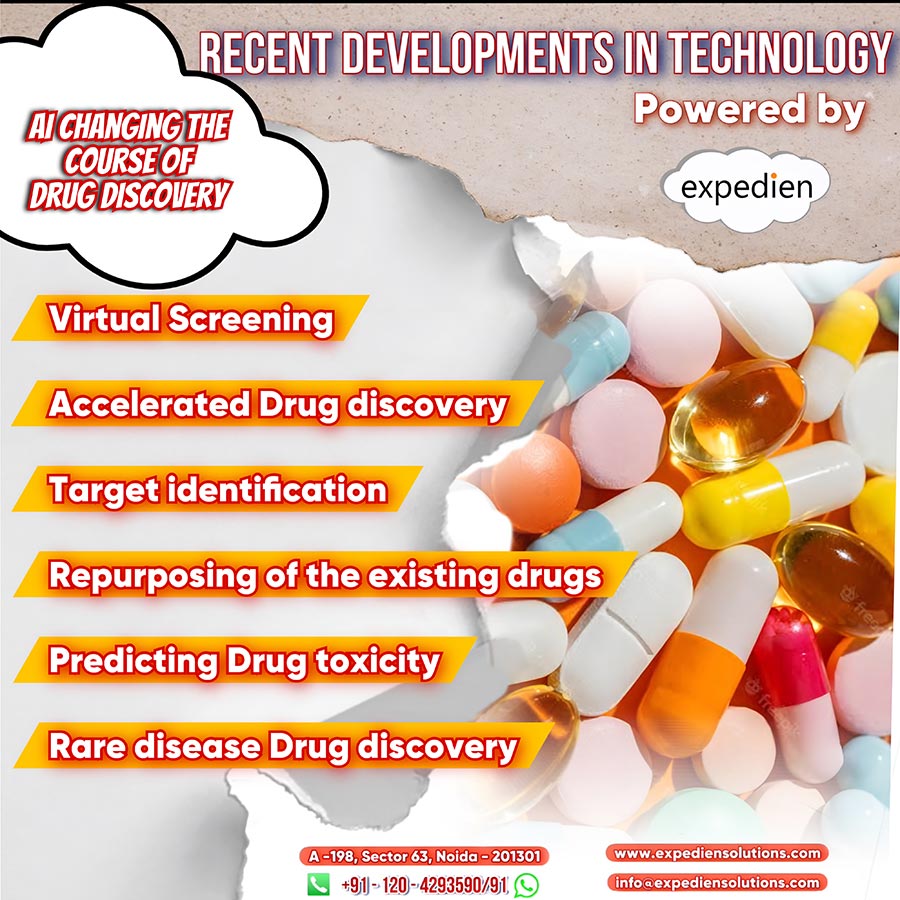- Home
- About Us
- Products
- Solutions
-

- Solutions by Industry
- Overview
-
- Solutions by Business Function
- Finance and Accounting
- Human Resource Management
- Purchase Management
- Operations Management
- Asset & Inventory Management
- Knowledge Management
- CRM - Customer Service, Call Center & Sales Automation
- Security & Surveillance
- BI and Data Warehousing
- Geo-Spatial Services & Solutions
- GIS based Turnkey Solutions
- Surveys
-
- Microsoft Dynamics Business Solution
- Overview
- Our Offerings
- Product Capabilities
- Industry Specific
-
- Services
- Clients
- Contact Us
Artificial intelligence in drug discovery and development
2 August 2023 | Expedien
The use of artificial intelligence (AI) has been increasing in various sectors of society, particularly the pharmaceutical industry. The use of AI reduces the human workload as well as achieving targets in a short period of time.
There has been a drastic increase in data digitalization in the pharmaceutical sector. This digitalization comes with the challenge of acquiring, scrutinizing and applying that knowledge to solve complex clinical problems. Hence AI also finds its utility here because it can handle large volumes of data with enhanced automation. AI utilizes algorithms that can interpret and learn from the input data to make independent decisions for accomplishing specific objectives. Its applications for achieving certain sets of results can be used to research about lot of possibilities in the field of Drug discovery.

Machine Learning uses algorithms that can recognize patterns within a set of data. A subfield of the ML is deep learning (DL) which engages with the artificial neural networks (ANNs). These comprise a set of interconnected sophisticated computing elements involving ‘perceptons’, these are developed to be similar to human biological neurons which can mimic the transmission of electrical impulses in the human.
AI in drug discovery : The lack of advanced technologies limit the drug development process making it a time-consuming and expensive task. AI can recognize and provide a quicker validation of the drug target along with the optimization of the drug structure design.
Role of artificial intelligence (AI) in drug discovery can be used effectively in different ways including drug design, chemical synthesis, drug screening, polypharmacology and drug repurposing.
AI in clinical trial design : Clinical trials are directed toward establishing the safety and efficacy of a drug in humans for a particular disease. Only one out of ten combinations of drugs which enter these trials gain successful clearance which is a massive loss for the chemical & medicine industry. These failures can be reduced with the implementation of AI as it provides much accurate results based on the algorithms which can effectively identify patterns and produce accurate drugs which can then be sent for trials.
Related Blogs
Stay informed
Subscribe to Expedien's Tech Digest blog


